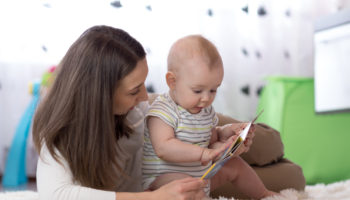Regina Wright
The education of young children is extremely important. To help children learn and grow, parents must take an active role in what their children are learning and how their brain is developing. The younger the child starts learning, the better. A large part of what a child knows is learned during his or her first three years when parents and caregivers have the most impact on their children. Parents are the first teachers and their influence is crucial.
According to the website Mental Floss, “A healthy baby will emerge from the womb with 100 billion neurons, nearly twice as many neurons as adults, in a brain that’s half the size. This massive number of neurons is necessary for the tremendous amount of learning a baby has to do in its first year of life.” Parents and caregivers must assist in the stimulation of their child’s developing brain. The bonds that are created between adults and infants stimulate learning to occur.
Learning games play a fundamental role in making a difference in the way a child’s brain grows. Learning games can be everyday experiences that happen in a child’s life; they are fun, responsive, unique and do not require enormous resources. What a parent or caregiver does in the first years of a child’s life can lay the groundwork for lifelong learning. Learning is a journey of experiences that can be fulfilling and create a multitude of joy and language is key.
Learning games can begin with the back and forth babbling or baby talk that is often associated with infant-adult communication. It may start with babbling and, through babbling or baby talk, words begin to form. This type of communication can occur through dialogue, music, storytelling and any communication that is heard by immersing the child in language.
While holding an infant in your lap and allowing him/her to hold a toy, you teach how to grasp things. Later you move the toy around and watch his eyes follow the toy. Now place the toy farther away from the child while he reaches farther and farther away. He will make longer and longer reaches. He is learning more about space and gaining the independence to trust himself to move about the world on his own.
Helping a child develop originality depends on how teachers and parents encourage and support his approach to how he learns. Some children will scoot and then walk before ever taking their first attempt at crawling. Allow them space to experiment and produce their own unique results. When children are given the freedom of movement to roll over, sit up, crawl, pull up, walk, run, reach and grab the child learns self-confidence and this supports his ability to actively move about.
We have all played a simple game of patty cake with an infant or young toddler. This teaches the child repetition, rhythm, and hand-eye coordination. It helps strengthen fine motor skills and memory. The child learns the idea of object permanence – or the understanding that objects continue to exist even when we can’t see them. This idea begins to emerge in infants 8-9 months old. To further build on this skill, you might show him a toy car, then turn him away so it’s out of sight. If he turns back to find it, let him have the car. Hug him or praise him as you give him the car to show you are pleased he turned to look for it.
Try labeling as a simple pre-requisite to reading. A two year old will look at the picture or item and the adult will name it. Now, the adult will talk about related topics that correspond with the word. The child begins to connect the object and words that go with it. The child learns that objects have names.
Try to understand how your child is feeling and give him some words to express it: “You’re sad because you dropped your ice cream.” He may give you a big smile to show how happy he is that you can share his feelings. Ask him to make faces that correspond with the feelings and emotions that you describe. You can read books and look at pictures of other children who are expressing emotions.
As a young child grows and develops, he is constantly acquiring new skills. With the support of an adult caregiver he will become an active explorer on his hunt to learn and discover new and exciting opportunities and skills. It is through acquiring new skills that his thirst for learning is fueled. We must make every effort to foster this innate curiosity to promote healthy growth and development. Learning games are fundamental and it’s never too early to begin. Remember every child learns at his own pace so be patient and have fun!
Additional Resources:
Fun and Creative Activities for Infants and Toddlers
Infants & Toddlers: Playing Games With Very Young Children
Best Baby Games: Birth to 18 Months
The Amazing Infant Brain




